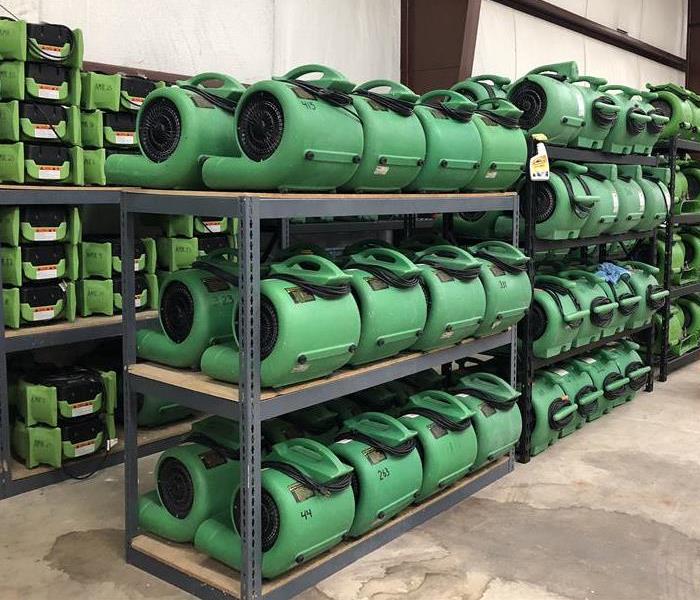DIY Mistakes to Avoid During Flood Cleanup
2/21/2023 (Permalink)
 SERVPRO of Mandarin has the professional drying equipment needed to mitigate your water damage safely and efficiently.
SERVPRO of Mandarin has the professional drying equipment needed to mitigate your water damage safely and efficiently.
Flooding is a serious threat to the integrity of your home. If not professionally treated, water damage can lead to harmful mold growth or structural issues and secondary damage. If you are determined to attempt flood damage restoration on your own, here are some common mistakes to avoid.
Waiting Too Long
Flood damage gets worse the longer it lingers. The drying process needs to begin, and damaged materials need to be removed as soon as possible.
Poor Assessment
Flood restoration professionals have special training and experience in looking for water damage and assessing the extent of it. Moisture and contaminants in rising water are great at hiding under floorboards or linoleum, or within walls and baseboards. The inspection must be thorough.
Using Insufficient or Improper Equipment or Supplies
Water damage professionals have specialized flood damage supplies and equipment that make it much easier to remove moisture. Unfortunately, your towels, a box fan, and a shop vac aren’t going to cut it. Check if your local hardware store has some of these items available to rent, as they are very expensive to buy.
- Heavy-duty Dehumidifier(s) - to pull the moisture out of the air and surfaces. Low Grain Refrigerant or LGR Dehumidifiers work best for residential water damage in our region.
- Heavy-duty Fan(s) - there are special fans designed to dry out rooms and surfaces, whisking moisture off of surfaces so it becomes airborne and can be filtered through the dehumidifier(s). (Please note: Fan(s) should only be used when water damage is caused by a clean water source and mitigation is begun swiftly. If the water source is flood water, rainwater, or sewage water, or it has been sitting for a few days before mitigation has begun it is not recommended to use fans as they can blow contaminants throughout your home or structure, affecting previously unaffected areas, and causing mold spores, if they are present, to spread. Stick to using air scrubbers and dehumidifiers only in this instance.)
- Air Scrubber(s) - these appliances suck in air and expel it through a several-layered filtration system, including a HEPA filter to remove impurities. Make sure the filters you are using are new. Real HEPA filters can be quite costly.
- Extraction Tool(s) - Basically a commercial-grade, high-powered wet vac that can suck up air from surfaces, and run it into a storage tank or treated drain line. An industrial model can remove a lot of water in a short time.
- Moisture Probe(s) - uses a coiled cable to find moisture where it’s hard to detect.
- Thermohygrometer(s) - a device that measures the amount of humidity in the air.
- Moisture Meter(s) - a device used to measure the amount of moisture in your structure including; drywall, base trim, and cabinetry.
- Floor and Wall Drying Systems - There are a variety of professional quality drying systems available to pull moisture from walls and floors.
Overlooking Hazards
Floods can create a number of dangerous conditions that professionals know to look out for. They include:
- Gas Leaks - Floods can damage gas lines in ways that can poison the air or cause an explosion. Turn off all gas connections, and smell for gas.
- Insecure Flooring - Water damage can weaken floor supports and soften floorboards, making them less stable. Tread lightly and carefully. If your foot falls through the floor you can get seriously injured.
- Electrical Hazards - Flood damage can affect your wiring and circuits in unpredictable and dangerous ways. Shut off your home’s power to avoid the risk of shock, and look for downed power lines.
- Sewage and Bacteria - Flooding can cause your plumbing to back up, which can make for very unsanitary conditions. Don’t ignore foul smells.
- Animals - Flooding can be hard on wildlife. Look for rats, possums, ants, and other creatures.
If your Northeast Florida home or business has suffered flood damage, call SERVPRO of Mandarin in Jacksonville. Our highly trained restoration technicians have the experience and equipment to restore your Mandarin, South San Jose, Julington Creek, Durbin, and Nocatee building(s) and get everything back to preloss condition. A trusted leader in the industry, we’ve served our community for more than 40 years. Call (904) 636-0044.






 24/7 Emergency Service
24/7 Emergency Service